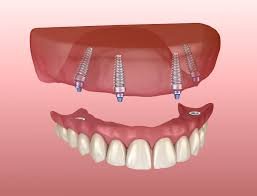Restoring a confident smile is one of the most transformative decisions you can make. For those missing teeth or struggling with dentures, dental implants offer a permanent, natural-looking solution. Yet, many people find themselves torn between two popular options: All-on-4 and traditional dental implants. Understanding the differences, benefits, and potential drawbacks can help you make the best choice – with expert guidance you’d experience with temecula center for dental implants – so your smile restoration journey feels empowering rather than overwhelming.
The Basics of Dental Implant Options
Before diving into the key differences, it’s helpful to understand the foundation of these treatments. Both solutions aim to replace missing teeth with durable, realistic restorations that restore chewing function and aesthetic appearance. However, their methods and long-term requirements vary significantly.
What Are Traditional Dental Implants?
Traditional implants involve placing a titanium post into the jawbone for each missing tooth, which acts like an artificial tooth root. After the bone heals and fuses around the implant, a crown, bridge, or denture is attached.
Key characteristics:
- Requires sufficient jawbone density for each implant.
- Healing and integration can take several months.
- Typically involves multiple procedures spread over time.
This approach is widely recognized for its durability and strength, but it often requires more time, cost, and in some cases, additional procedures such as bone grafting.
What Is the All-on-4 Technique?
All-on-4 is a specialized method designed for patients missing most or all teeth in one arch. Instead of replacing each tooth individually, this technique uses just four strategically angled implants to support a full arch of prosthetic teeth.
Key characteristics:
- Immediate functionality is often possible, allowing patients to leave the procedure with a temporary set of teeth.
- Requires fewer implants, minimizing the need for bone grafting.
- Typically faster and more cost-effective than replacing teeth one by one.
This streamlined solution has grown in popularity for its ability to deliver dramatic results in a shorter timeframe.
Comparing the Two Approaches
Both traditional implants and All-on-4 have unique advantages. The right choice depends on your oral health, lifestyle, and long-term goals.
Procedure Timeframe
- Traditional implants often require several stages: consultation, implant placement, healing period (3–6 months), and final restoration.
- All-on-4 can often be completed in one day, with temporary teeth placed immediately, followed by permanent ones after healing.
Cost Considerations
- Traditional implants may become costly if multiple teeth are replaced individually.
- All-on-4 tends to be more cost-efficient for full arch replacement, as fewer implants are required.
Bone Health and Suitability
- Traditional implants require adequate bone density, which sometimes means bone grafting before placement.
- All-on-4 utilizes angled implants that maximize available bone, often eliminating the need for grafting.
The Benefits of Traditional Implants
If you’re missing one or just a few teeth, traditional implants often provide unmatched precision and durability.
Long-Term Durability
When properly cared for, traditional implants can last decades. Each implant acts independently, which distributes chewing forces naturally.
Natural Feel
Because each implant is anchored individually, patients often say traditional implants feel almost identical to natural teeth.
Customization
Traditional implants allow for tailored solutions whether you’re replacing a single tooth, a bridge, or multiple teeth across different areas.
The Benefits of All-on-4
For patients who are missing most of their teeth or want a faster, full-arch replacement, All-on-4 has clear advantages, as detailed on the premieroralnfacialsurgery.com website.
Faster Results
Many patients appreciate the same-day aspect of All-on-4, walking out of surgery with a full set of functioning teeth.
Lower Overall Cost
Replacing an entire arch with fewer implants means reduced costs in many cases, making smile restoration more accessible.
Less Invasive
With fewer implants needed and angled placement maximizing bone support, this method can bypass bone grafting and shorten recovery time.
Which One Is Right for You?
Deciding between these two options often comes down to individual needs. Here’s a quick way to think about it:
- Choose traditional implants if:
- You’re only missing one or a few teeth.
- You want the most natural, tooth-by-tooth replacement.
- You don’t mind a longer treatment timeline.
- You’re only missing one or a few teeth.
- Choose All-on-4 if:
- You’re missing most or all of your teeth in one arch.
- You want a faster, cost-effective solution.
- You prefer to avoid bone grafting or multiple surgeries.
- You’re missing most or all of your teeth in one arch.
Preparing for Your Implant Journey
No matter which path you choose, preparation is key to success. Your dentist will perform a thorough exam, including 3D imaging, to evaluate your bone health and oral condition. Discuss your lifestyle, long-term goals, and budget openly so your treatment plan feels personalized rather than one-size-fits-all.
Caring for Your New Smile
After either procedure, proper maintenance ensures longevity and comfort.
Essential steps include:
- Daily brushing and flossing around implants.
- Routine professional cleanings and checkups.
- Avoiding habits that can damage implants, such as smoking or chewing ice.
With the right care, both All-on-4 and traditional implants can provide decades of confident smiles.
Final Thoughts
When comparing All-on-4 vs. traditional dental implants, there isn’t a one-size-fits-all answer. Both options provide life-changing results, restoring function, confidence, and quality of life. The best choice depends on how many teeth you’re replacing, your bone health, timeline expectations, and financial considerations. By working closely with a skilled dental team, you can find the solution that best supports your journey to a lasting, radiant smile.
